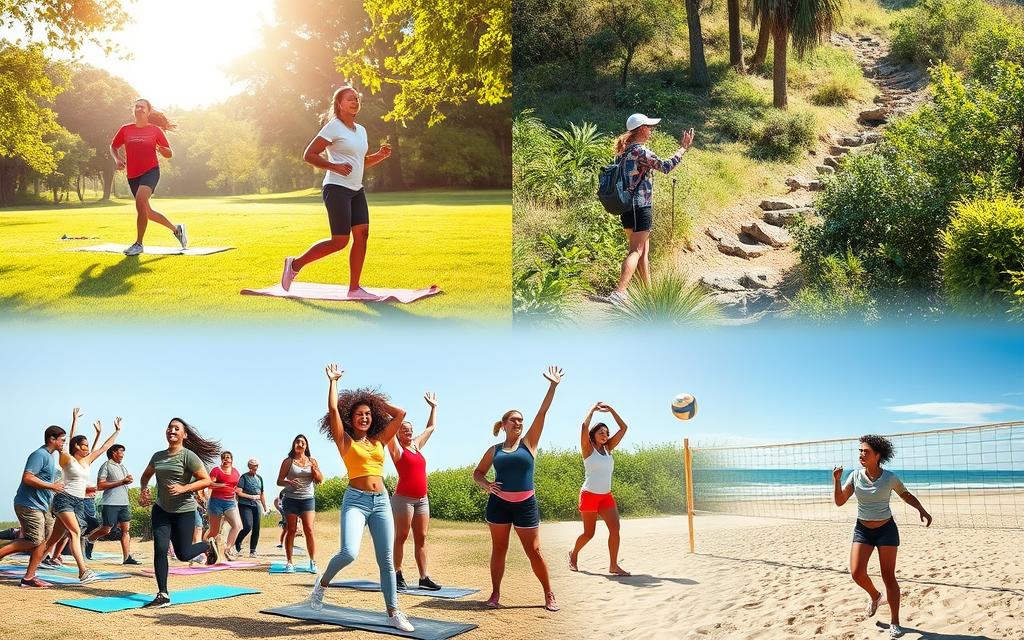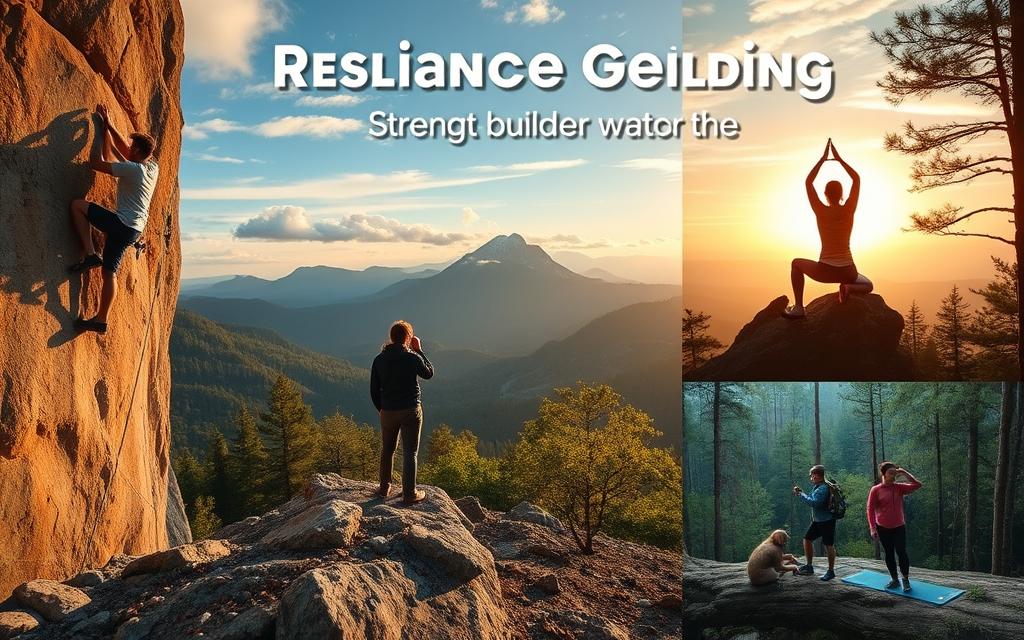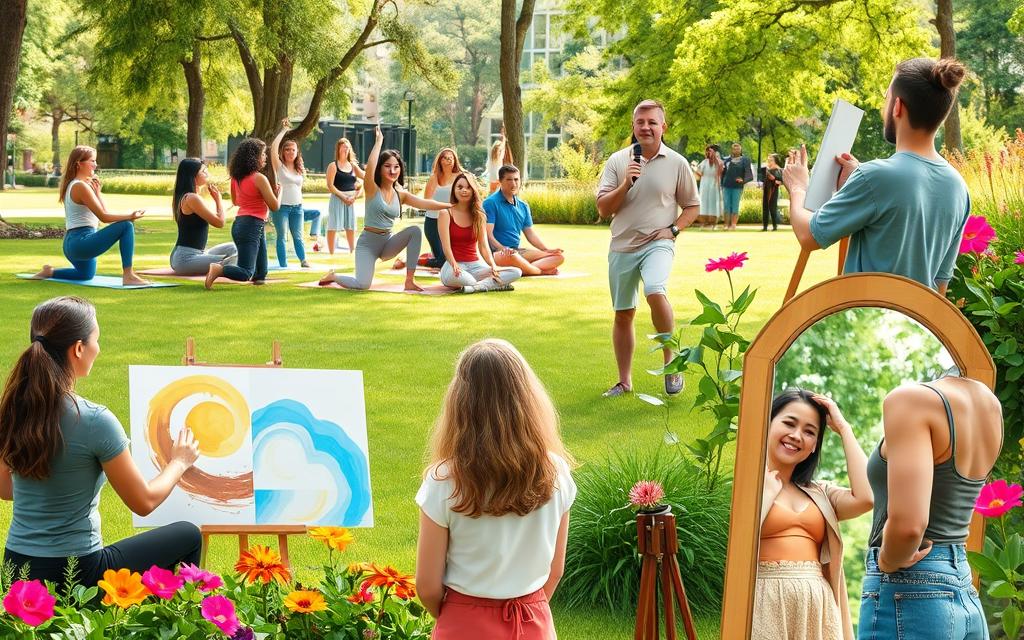Ever felt like you’re not good enough or always doubting yourself? You’re not alone. Building self-confidence is a journey many face, but it’s worth it. Imagine feeling empowered and ready for any challenge. That’s what confidence-building activities can do for you.
In this guide, we’ll explore exercises and techniques to boost self-esteem and personal growth. Whether you want to overcome fear, build a positive self-image, or pursue dreams with confidence, you’ll find help here.
Confidence isn’t something you’re born with. It’s a skill you can develop. By doing various confidence-building activities, you’ll boost your self-worth and open doors to a better life. Let’s start this journey together!
The path to more confidence is made of small steps. By focusing on these activities, you’ll build the self-assurance needed to face challenges and achieve success. Let’s explore confidence-building together!
Ready to start? Find confidence-building activities to unlock your potential and live your dream life.
Understanding the Psychology of Self-Confidence
Self-confidence is a mix of many psychological factors. Knowing this is key to building confidence. At the core is positive self-talk and beating mental hurdles.
The Connection Between Self-Talk and Confidence
Our inner talk greatly shapes how we see ourselves and our confidence. Positive self-talk boosts our belief in ourselves. But negative self-talk can hurt our confidence and performance.
How Self-Esteem Impacts Daily Life
Self-esteem is tied to confidence and affects our daily lives. People with high self-esteem make better choices, have healthier relationships, and reach their goals. On the other hand, low self-esteem leads to doubt, anxiety, and not reaching our full potential.
Breaking Down Mental Barriers
Building self-confidence means overcoming mental barriers. These are negative thoughts and beliefs that hold us back. By facing and challenging these, we can unlock our true potential and have a more positive mindset.
Understanding self-confidence’s psychology is the first step to personal growth and empowerment.
Essential Confidence-Building Activities for Personal Growth
Building confidence is a journey of self-discovery and growth. By trying different activities, people can reach their full potential and feel better about themselves. These activities, from grooming to positive thinking, can change how we see ourselves and feel.
Writing letters to yourself is a powerful way to boost confidence. It’s about thanking yourself for your achievements and recognizing your strengths. Creating an “achievement collage” is also helpful. It lets you see your successes in a visual way.
Practicing gratitude through journaling or sharing positive thoughts can also change your mindset. It helps you focus on the good things in life and feel more hopeful.
But there’s more to building confidence. Activities like mindfulness, setting goals, and learning about emotions can also help. By facing challenges and overcoming mental barriers, you can build self-worth and courage.
It’s important to find activities that work for you and do them regularly. By focusing on personal growth and self-care, you can unlock the power of confidence. This can lead to success in many areas of your life.
- Write letters to yourself expressing gratitude and acknowledging strengths
- Create an “achievement collage” to visually celebrate your successes
- Practice gratitude through journaling or sharing positive affirmations
- Engage in mindfulness practices, goal-setting, and emotional intelligence development
- Overcome mental barriers and embrace challenges to build resilience
Transforming Negative Self-Talk into Positive Affirmations
Many people struggle with negative self-talk. It can really hurt our confidence and how we feel about ourselves. This inner critic can make us doubt ourselves and feel pessimistic. But, we can change this by using positive affirmations to boost our self-assurance.
Identifying Negative Thought Patterns
To beat negative self-talk, first, we need to know what thoughts are holding us back. These might be things like “I’m not good enough” or “I’ll never succeed.” Once we spot these thoughts, we can start to replace them with more positive ones.
Techniques for Mental Reframing
Mental reframing is a great way to change negative thoughts into positive ones. It’s about swapping “I can’t do this” for “I’ll try my best.” This change can make us feel stronger and more confident in what we can do.
Daily Positive Affirmation Practices
- Write a letter to yourself, expressing self-appreciation and highlighting your strengths.
- Use affirmation cards or Post-it notes with positive affirmations placed in visible areas as daily reminders.
- Incorporate positive self-talk into your morning routine, reciting affirmations that align with your goals and values.
Doing these daily positive affirmation exercises can change your mind. It can help you feel more confident and positive. By making mindset training a regular part of your life, you can reach your full potential.
Physical Activities That Boost Self-Esteem
Regular physical activities can greatly improve confidence and self-esteem. Exercise not only boosts physical health but also mental well-being. Activities like yoga, weightlifting, and team sports help people face fears and build resilience. They also help develop a stronger sense of self-worth.
Studies show that yoga, weightlifting, and aerobic exercises positively affect self-esteem. These activities build strength and endurance, leading to a sense of accomplishment. Group sports also boost self-esteem, thanks to the support and interaction from teammates.
Adults who focus on fitness experience less stress and higher self-esteem. Physical activities help relax and express oneself, leading to a positive self-image. Activities like jogging, dance classes, or team sports can greatly enhance confidence and personal growth.

Physical activities improve mood and foster a sense of achievement. They are key to boosting self-esteem and personal growth. Embracing movement and challenges can unlock a new level of confidence and well-being.
Social Confidence Through Group Activities
Joining group activities can really help boost your social confidence. You can try team-building, communication workshops, or public speaking. These activities help you learn important assertiveness skills and face your fears of being in social situations.
Team Building Exercises
Playing cooperative board games and working on group projects can help you make friends and improve your social skills. When you work together, you learn to talk clearly, make compromises, and trust each other. This can make you feel more confident and self-assured in social situations.
Communication Skills Development
Being part of group activities that focus on communication can make you a better and more confident speaker. You’ll get to practice listening well, using your body language, and sharing your thoughts clearly. These activities are a safe place to try out these skills.
Public Speaking Practice
Practicing public speaking is a great way to build your confidence. Doing presentations, debates, and other speaking exercises can help you get over your fear of speaking in front of people. You’ll learn to be more assertive and self-assured when you talk to others.
By taking part in these group activities, you’ll not only get better at social skills. You’ll also feel more connected and confident, which can improve your life in many ways.
Professional Development and Workplace Confidence
Building leadership skills and assertiveness is key to feeling confident at work. Activities like skill-building workshops and leadership training can boost your self-assurance. They also improve your performance.
Setting and reaching professional goals helps too. Getting feedback and taking on new challenges also build confidence. For instance, joining ASCE gives civil engineers a chance to connect with experts. This helps them grow in their careers.
- 32% of surveyed individuals were afraid to propose new ideas to their teams in a workplace setting.
- 29% expressed fear related to client meetings in the workplace.
- 20% of respondents described themselves as “pushovers” in a professional environment.
- 50% of surveyed individuals dreaded public speaking or giving presentations in front of large groups.
Learning to be assertive is important. It helps you communicate well and share your ideas. Being confident often means seeking advice from experienced people. This can be done through joining organizations like ASCE.

Being confident at work can lead to better performance and job satisfaction. Regular, honest feedback can motivate employees. It helps them grow in leadership roles.
Mindfulness and Meditation for Self-Assurance
Building confidence and self-assurance is a journey. Mindfulness and meditation are powerful tools in this journey. They help us become more aware of the present moment and kinder to ourselves.
Breathing Techniques for Confidence
Breath work is key in mindfulness training. Mindful breathing helps manage stress and anxiety. These feelings often hurt our self-confidence. Techniques like deep belly breathing and alternate nostril breathing calm the mind and build inner strength.
Visualization Exercises
Visualization exercises are great for personal growth techniques and self-assurance. They help us imagine ourselves succeeding and being our best selves. This practice boosts performance and reduces self-doubt, making us feel more positive about ourselves.
Daily Mindfulness Routines
- Body scans: Tuning into the sensations in the body can foster self-awareness and acceptance.
- Guided meditations: Following along with recorded audio or video instructions can make mindfulness more accessible.
- Journaling: Writing down thoughts, feelings, and gratitudes can promote self-reflection and emotional regulation.
Adding these mindful practices to our daily routine can greatly improve self-assurance. Being present, compassionate, and aware of our inner experiences helps us overcome doubts. This way, we build a stronger sense of confidence.
Building Resilience Through Challenge Activities
Resilience is key for success in life and work. It’s about bouncing back from tough times. Engaging in confidence-building activities helps build this skill. These activities push people to face their fears and learn to cope.
Obstacle courses, problem-solving tasks, and adventure sports are great for building resilience. They teach us to keep going, adapt, and find new ways to solve problems. Overcoming these challenges boosts our confidence and prepares us for the future.
- Obstacle courses test our physical and mental strength, teaching us to stay focused and adapt.
- Problem-solving tasks improve our critical thinking, teamwork, and ability to learn from mistakes.
- Adventure sports like rock climbing or white-water rafting help us face our fears and build trust in ourselves.
These confidence-building activities do more than just build resilience. They also improve problem-solving, communication, and teamwork skills. By facing challenges and learning from them, we grow stronger and more resilient, ready to handle life’s ups and downs.

Creative Expression as a Confidence Booster
Unlocking your creative side can really boost your self-esteem and personal growth. Activities like art therapy, writing, and performing can make you feel more confident and self-discovered.
Art Therapy Techniques
Art therapy lets you explore your feelings and grow in self-awareness. Through painting, drawing, or sculpting, you can express your emotions and understand yourself better. It’s a great way to build self-esteem by celebrating your unique creativity.
Writing Exercises for Self-Discovery
Journaling and writing can be great for boosting self-esteem. Writing stories, poetry, or reflecting on your life can help you grow. It lets you understand yourself better, leading to more confidence and self-acceptance.
Performance-Based Activities
Doing theater, dance, or public speaking can also boost your self-esteem. These activities push you out of your comfort zone and show off your skills. Overcoming your fears and succeeding in these areas can make you feel proud and more confident.
Embracing creativity can change your life, helping you grow and feel more confident. Whether you love art, writing, or performing, these activities can deepen your self-understanding and unlock your confidence.
Goal Setting and Achievement Strategies
Setting and achieving goals is key to building confidence. Start by setting SMART goals. These are Specific, Measurable, Achievable, Relevant, and Time-bound. Having a plan and celebrating your wins keeps you motivated.
Tracking your progress and adjusting your goals as needed is important. Even small victories can make you feel accomplished and boost your confidence.
Research shows that being grateful can increase self-esteem. Writing about gratitude a few times a month can make you think more positively. Setting goals and celebrating your progress can also boost confidence in kids.
Building positive relationships and social skills is vital for kids’ confidence. Playing cooperative games can improve these skills and boost self-esteem. Recognizing achievements can also make kids feel good about themselves.
Writing letters to your future self can help set goals and reflect on progress. Changing negative self-talk can improve self-esteem. Journaling about gratitude can also make kids think more positively.

Confident people know their strengths and weaknesses. They use their strengths and plan for their weaknesses. Many people doubt themselves, but only 30% of goals lead to lasting satisfaction.
Strategies for a resilient mindset can help with stress and self-confidence. Many people fear failure and avoid new challenges. Perfectionism can also hold you back.
Letting go of things you can’t control can empower you. Embracing change and being curious can help you adapt to life’s ups and downs. Curiosity can solve problems and make you more creative.
Developing Emotional Intelligence for Greater Confidence
Emotional intelligence is key for boosting self-confidence and improving relationships. By developing emotional intelligence coaching, people can learn to handle their emotions better. This leads to more assertiveness skills and a stronger sense of self-assurance.
Emotional intelligence has five main parts: self-awareness, self-regulation, motivation, empathy, and social skills. Having a strong grasp of these areas helps people handle social and work situations with confidence and calm.
- Self-awareness: Knowing one’s own emotions, strengths, and weaknesses is the base of emotional intelligence. This self-knowledge helps individuals tackle challenges and opportunities with clarity and honesty.
- Self-regulation: Being able to control one’s emotions, rather than letting them control decisions, is a key trait of emotionally intelligent leaders. They stay calm and focused, even when things get tough.
- Motivation: Emotionally intelligent people are self-driven and aim to reach their goals. They find inspiration from within, not just from outside.
- Empathy: The ability to understand and share others’ feelings is vital for building strong bonds and a sense of connection.
- Social Skills: Being good at communication, solving conflicts, and inspiring teamwork are all parts of emotional intelligence. These skills help boost self-confidence and success in relationships.
By growing these emotional intelligence skills, people can gain a deeper understanding of themselves. They can also manage their emotions better and connect more deeply with others. This leads to more self-confidence and a sense of personal and professional fulfillment.
The Role of Personal Appearance in Self-Esteem
Our personal appearance greatly affects our self-esteem and confidence. How we groom ourselves and carry ourselves matters a lot. It shapes how we see ourselves in the eyes of others.
Research shows that early life experiences can hurt self-esteem. Being teased or bullied can make it hard to see our good qualities. Later life changes in appearance can also lower self-esteem, making us feel lost.
Self-esteem is influenced by how we see ourselves and others. Negative thoughts, like comparing ourselves to others, can hurt our self-esteem. It’s important to focus on our strengths, not just our weaknesses.
Building confidence means recognizing our talents and abilities. It’s about valuing ourselves, not just comparing to others. Having a supportive network and staying positive can help.

Appearance-based self-esteem is key to feeling confident. We can improve how we see ourselves by challenging beauty norms and growing personally. Surrounding ourselves with support helps us feel empowered to achieve our dreams.
Conclusion
Building confidence is a journey that never ends. It involves many activities and strategies. People can boost their self-esteem by practicing and reflecting on themselves every day.
By adding confidence-building activities, self-esteem exercises, and personal growth techniques to their daily routine, they can fight self-doubt. They can also chase their dreams with more confidence. This leads to a more satisfying life.
Studies show how important confidence is in our lives. Middle school students who build their confidence are more likely to lead and stand up to bad influences. Confidence is key for success in today’s fast-changing world.
It helps students express themselves and handle challenges well. They can do this by using positive affirmations, staying active, making friends, or being creative.
By focusing on their growth and happiness, people can open doors to new chances. They can make deep connections and reach their goals with confidence.
